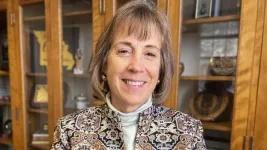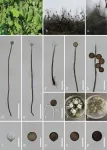(Press-News.org) COLUMBIA, Mo. -- Christi Bergin has devoted 40 years of her life to helping teachers and their students. Throughout her career, she’s noticed two simultaneous trends in the field that seem to be connected: a rise in disruptive classroom behavior, and an exodus of teachers from the profession who leave due to stress and burnout.
To help combat these trends, Bergin, a professor emerita in the University of Missouri College of Education and Human Development, has focused her research on improving prosocial behavior — actions that show kindness, compassion, empathy and respect — in classrooms and communities.
Not only is her approach timely; it works.
Bergin’s decades of research shows that this focus on soft skills improves student engagement, academic achievement, relationships and peer-acceptance while also reducing teacher stress and burnout.
Expanding the benefits from Missouri to the Midwest
Bergin is currently helping fifth grade math and science teachers throughout Missouri tweak their teaching techniques in a way that promotes prosocial behavior in their classrooms. The Prosocial and Active Learning (PAL) grant is a partnership with a professional development center within MU known as eMINTS, or the enhancing Missouri’s Instructional Networked Teaching Strategies.
The results from the PAL grant have been so successful, the U.S. Department of Education has now awarded Bergin and eMINTS an $8 million grant to expand their project into 80 middle schools throughout Missouri, Kansas, Oklahoma and Arkansas. The five-year project will reach 1,200 teachers and administrators as well as 25,000 students.
“It is critically important in schools that teachers not only focus on math, reading and all the other core subject areas, but they also need to help students become productive citizens,” said Chris Riley-Tillman, dean of the MU College of Education and Human Development. “Dr. Bergin’s work is preventative in nature by training the core skills to make one successful versus reacting after you have problems.”
Minor tweaks, major impacts
One of Bergin’s major takeaways is that well-intentioned systems of reward and discipline could actually be doing more harm than good. For instance, the use of rewards, punishments and bribes, or “points” systems, are often perceived by students as authoritarian or threatening and can actually undermine prosocial behavior.
“Instead, our lab focuses on evidence-based strategies that focus on a specific form of discipline called induction, which means providing children with reasoning for why you’re asking them to change their behavior,” Bergin said. “For example, by saying, ‘You should stop talking because you’re disturbing your classmates who are quietly working,’ instead of, ‘Stop talking or else you will be punished,’ the student learns the idea of empathy by considering how they would feel if another student were to disrupt them rather than feeling threatened by the teacher.”
While the professional development interventions are based in 50 years of research on prosocial education, the practices are not widely applied in the classroom.
“Teachers are trying their best, but we hear from so many of them that are struggling with classroom management strategies that promote prosocial behavior to the point that many no longer assign groupwork because the students just can’t get along,” said Jen Foster, an instructional consultant with eMINTS and former teacher who leads the PAL grant with Bergin. “Our main goal is to raise awareness of what strategies work best for teachers interacting with their students.”
Simple, yet effective strategies teachers can use in the classroom to promote prosocial behavior include:
Emphasizing person-specific praise (i.e. “I appreciate you” rather than “I appreciate that”).
Pointing out positive behavior being demonstrated in the classroom instead of only pointing out negative behavior.
Avoiding a rise in tone of voice when reminding students of specific instructions.
Avoiding threats of punishments or the use of bribes.
Bergin added that benefits to prosocial behavior extend far beyond the classroom.
“The world economic forum recently said that, for the rising workforce, there is a significant need for employees with greater social skills and the ability to get along well with others, especially as the workforce continues to become more diverse,” Bergin said. “By emphasizing empathy, kindness and cooperation, prosocial behavior leads to better job stability, better family life, and better acceptance from colleagues and peers.”
While the current PAL grant will end by summer 2024, the new $8 million in funding from the U.S. Department of Education will expand the impact Bergin and eMINTS can make for the next five years and beyond.
END
Promoting prosocial behavior in the classroom and beyond
With an $8 million grant from the US Department of Education, MU’s Christi Bergin will continue to help teachers throughout the Midwest improve their classroom culture.
2024-02-06
ELSE PRESS RELEASES FROM THIS DATE:
Perceptions of manhood and masculinities among disabled violently injured Black men in a hospital-based violence intervention program
2024-02-06
Black men with firearm-acquired disabilities face negative physical and psychological impacts on their manhood, independence and mobility, according to a Rutgers Health study.
The study, published in the American Journal of Men’s Health, explored the relationship between Black manhood/masculinities and firearm-acquired disabilities. Participants’ disabilities also impacted their perceptions of independence. Specifically, participants felt that they were a burden to their caretakers because of their reliance on them. This loss of independence ...
Two new freshwater fungi species in China enhance biodiversity knowledge
2024-02-06
Researchers have discovered two new freshwater hyphomycete (mould) species, Acrogenospora alangii and Conioscypha yunnanensis, in southwestern China.
This discovery, detailed in a study published in MycoKeys, marks the addition of these species to the Acrogenospora and Conioscypha genera, further enriching the diversity of freshwater fungi known in the region.
A research team consisting of Lu Li, Hong-Zhi Du and Ratchadawan Cheewangkoon from Chiang Mai University, Thailand, as well as Vinodhini Thiyagaraja and Rungtiwa Phookamsak from Kunming Institute of Botany, China, and Darbhe Jayarama Bhat from King Saud University, Saudi Arabia, employed comprehensive morphological ...
Apex predators not a quick fix for restoring ecosystems, 20-year CSU study finds
2024-02-06
A Colorado State University experiment spanning more than two decades has found that removal of apex predators from an ecosystem can create lasting changes that are not reversed after they return – at least, not for a very long time.
The study, funded by the National Science Foundation and published in Ecological Monographs, challenges the commonly held belief that the reintroduction of wolves to Yellowstone National Park restored an ecosystem degraded by their absence.
Researchers in CSU’s Warner College of Natural Resources ...
Do digital technologies offer a better way to loan people money?
2024-02-06
A new paper in the Quarterly Journal of Economics, published by Oxford University Press, finds that a new form of digital technology—essentially preventing people from using an asset for which they have a loan if they don’t make payments, rather than repossessing the asset itself—may be a better way for lenders to secure loans, particularly for loan recipients in developing countries.
Using collateral to secure debt helps overcome economic frictions, lowering the cost of providing credit. More than 80% of total household debt in the United States is secured by ...
Fiona M. Watt receives the 2024 ISSCR Achievement Award for her seminal work with skin stem cells
2024-02-06
Evanston, IL—The International Society for Stem Cell Research (ISSCR) will award its 2024 ISSCR Achievement Award to Fiona M. Watt, D.Phil., F.R.S., F.Med.Sci., EMBO Director and leader of a research group at EMBL - Heidelberg, Germany. The award recognizes the transformative body of work of an investigator that has had a major impact on the field of stem cell research or regenerative medicine. Dr. Watt will present her research during Plenary VII on 13 July at the ISSCR 2024 Annual Meeting in Hamburg, Germany. ISSCR 2024 is the world’s leading gathering of the brightest minds in stem cell research and cell and regenerative medicine.
“Fiona is a giant in stem cell ...
Jun Wu receives the 2024 ISSCR Outstanding Young Investigator Award for his innovative work on stem cell-based embryo and chimera models
2024-02-06
Evanston, IL—The International Society for Stem Cell Research (ISSCR) is honoring Jun Wu, Ph.D. with the 2024 ISSCR Outstanding Young Investigator Award. Dr. Wu is an associate professor in the Department of Molecular Biology at the University of Texas Southwestern Medical Center, U.S.A. and a New York Stem Cell Foundation–Robertson Investigator.
The award recognizes the exceptional achievements of an investigator in the early part of his or her independent career in stem cell research. Dr. Wu will present his work during Plenary II, New Technologies to Engineer and Phenotype Stem Cell Systems, on 10 July during the ISSCR 2024 Annual Meeting taking place in Hamburg, Germany. ...
Sergiu P. Paşca receives the 2024 ISSCR Momentum Award for his pioneering work in neurodevelopment and disease
2024-02-06
Evanston, IL— The International Society for Stem Cell Research (ISSCR) will present this year’s ISSCR Momentum Award to Sergiu P. Paşca, M.D., Kenneth T. Norris, Jr. Professor and the Uytengsu Director of Stanford Brain Organogenesis, Stanford University, U.S.A. The award recognizes the exceptional achievements of a mid-career investigator whose innovative research has established a major area of stem cell-related research with a strong trajectory for future success.
Dr. Paşca will present his research during Plenary VII on 13 July 2024 during the ISSCR 2024 Annual Meeting in Hamburg, Germany. ISSCR 2024 is the world’s leading ...
Understanding neurodiversity across the UK population - study
2024-02-06
A new study has provided insight into how experiences and features of neurodiversity vary amongst adults in the UK.
There is variation in people’s attributes and experiences across all populations. Neurodivergent people, such as people with a diagnosis of ADHD, dyslexia, dyspraxia, or autism, may experience the world in distinctive ways. But, we are only beginning to appreciate how traits and experiences associated with neurodivergence differ across the whole population.
Now, new research from the University of Birmingham has provided a more detailed picture of what neurodiversity looks like amongst adults in the UK.
The research is published in JCPP Advances.
Ian Apperly, ...
A new origin story for deadly Seattle fault
2024-02-06
American Geophysical Union
6 February 2024
AGU Release No. 24-04
For Immediate Release
This press release is available online at: https://news.agu.org/press-release/seattle-fault-may-have-origins-in-an-ancient-tear-in-the-continent
Seattle fault may have origins in an ancient tear in the continent
Magnetic data suggest the hazardous Seattle fault zone developed as the edge of the continent tore itself in two more than 50 million years ago, providing a possible new origin story for the fault
AGU ...
Which came first: Black holes or galaxies?
2024-02-06
Black holes not only existed at the dawn of time, they birthed new stars and supercharged galaxy formation, a new analysis of James Webb Space Telescope data suggests.
The insights upend theories of how black holes shape the cosmos, challenging classical understanding that they formed after the first stars and galaxies emerged. Instead, black holes might have dramatically accelerated the birth of new stars during the first 50 million years of the universe, a fleeting period within its 13.8 billion—year history.
"We know these monster black holes ...
LAST 30 PRESS RELEASES:
Why conversation is more like a dance than an exchange of words
With Evo 2, AI can model and design the genetic code for all domains of life
Discovery of why only some early tumors survive could help catch and treat cancer at very earliest stages
Study reveals how gut bacteria and diet can reprogram fat to burn more energy
Mayo Clinic researchers link Parkinson's-related protein to faster Alzheimer's progression in women
Trends in metabolic and bariatric surgery use during the GLP-1 receptor agonist era
Loneliness, anxiety symptoms, depressive symptoms, and suicidal ideation in the all of us dataset
A decision-support system to personalize antidepressant treatment in major depressive disorder
Thunderstorms don’t just appear out of thin air - scientists' key finding to improve forecasting
Automated CT scan analysis could fast-track clinical assessments
New UNC Charlotte study reveals how just three molecules can launch gene-silencing condensates, organizing the epigenome and controlling stem cell differentiation
Oldest known bony fish fossils uncover early vertebrate evolution
High‑performance all‑solid‑state magnesium-air rechargeable battery enabled by metal-free nanoporous graphene
Improving data science education using interest‑matched examples and hands‑on data exercises
Sparkling water helps keep minds sharp during long esports sessions
Drone LiDAR surveys of abandoned roads reveal long-term debris supply driving debris-flow hazards
UGA Bioinformatics doctoral student selected for AIBS and SURA public policy fellowship
Gut microbiome connected with heart disease precursor
Nitrous oxide, a product of fertilizer use, may harm some soil bacteria
FAU lands $4.5M US Air Force T-1A Jayhawk flight simulator
SimTac: A physics-based simulator for vision-based tactile sensing with biomorphic structures
Preparing students to deal with ‘reality shock’ in the workplace
Researchers develop beating, 3D-printed heart model for surgical practice
Black soldier fly larvae show promise for safe organic waste removal
People with COPD commonly misuse medications
How periodontitis-linked bacteria accelerate osteoporosis-like bone loss through the gut
Understanding how cells take up and use isolated ‘powerhouses’ to restore energy function
Ten-point plan to deliver climate education unveiled by experts
Team led by UC San Diego researchers selected for prestigious global cancer prize
Study: Reported crop yield gains from breeding may be overstated
[Press-News.org] Promoting prosocial behavior in the classroom and beyondWith an $8 million grant from the US Department of Education, MU’s Christi Bergin will continue to help teachers throughout the Midwest improve their classroom culture.








